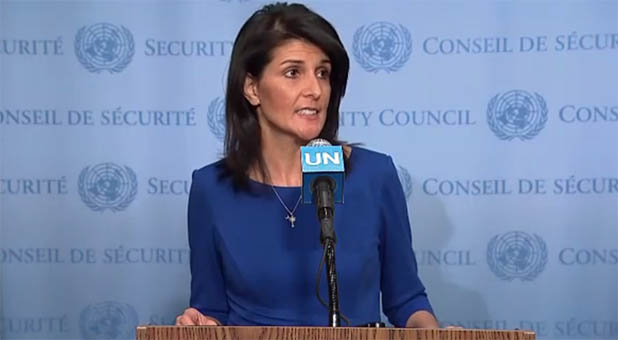UN Ambassador Nikki Haley: U.S. Won’t Turn a Blind Eye to This Anymore
The Trump administration has put the United Nations on notice: it will no longer tolerate anti-Israel bias from the Security Council.
Ambassador Nikki Haley lashed out at the council during a press availability at U.N. headquarters. She accused the world body of a “breathtaking” level of bias against the Jewish state and conveyed President Donald Trump’s message: the U.S. won’t turn a blind eye to it ever again.
Here’s the full transcript of her speech:
The first thing I want to do is talk about what we just saw in there. The Security Council just finished its regular monthly meeting on Middle East issues. It’s the first meeting like that that I’ve attended, and I have to say it was a bit strange. The Security Council is supposed to discuss how to maintain international peace and security. But at our meeting on the Middle East, the discussion was not about Hezballah’s illegal build-up of rockets in Lebanon. It was not about the money and weapons Iran provides to terrorists. It was not about how we defeat ISIS. It was not about how we hold Bashar al-Assad accountable for the slaughter of hundreds and thousands of civilians. No, instead, the meeting focused on criticizing Israel, the one true democracy in the Middle East. I am new around here, but I understand that’s how the Council has operated, month after month, for decades.
I’m here to say the United States will not turn a blind eye to this anymore. I am here to underscore the ironclad support of the United States for Israel. I’m here to emphasize the United States is determined to stand up to the U.N.’s anti-Israel bias. We will never repeat the terrible mistake of Resolution 2334 and allow one-sided Security Council resolutions to condemn Israel. Instead, we will push for action on the real threats we face in the Middle East.
We stand for peace. We support a solution to the Israeli-Palestinian conflict that is negotiated directly between the two parties, as President Trump reiterated in his meeting with Prime Minister Netanyahu yesterday. The outrageously biased resolutions from the Security Council and the General Assembly only make peace harder to attain by discouraging one of the parties from going to the negotiating table.
Incredibly, the U.N. Department of Political Affairs has an entire division devoted to Palestinian affairs. Imagine that. There is no division devoted to illegal missile launches from North Korea. There is no division devoted to the world’s number one state-sponsor of terror, Iran. The prejudiced approach to Israeli-Palestinian issues does the peace process no favors. And it bears no relationship to the reality of the world around us.
The double standards are breathtaking. Just a few days ago, the United States sought unsuccessfully to have the Security Council condemn a terrorist attack to Israel, where the terrorist opened fire on people waiting for a bus and then stabbed others. The Security Council would not hesitate to condemn an attack like that in any other country. But not for Israel. The statement was blocked. And that’s downright shameful.
Israel exists in a region where others call for its complete destruction and in a world where anti-Semitism is on the rise. These are threats that we should discuss at the United Nations as we continue working toward a comprehensive agreement that would end the Israeli-Palestinian conflict.
But outside of the U.N., there is some good news. Israel’s place in the world is changing. Israel is building up new diplomatic relationships. More and more countries recognize how much Israel contributes to the world. They are recognizing that Israel is a beacon of stability in a troubled region and that Israel is at the forefront of innovation, entrepreneurship and technological discovery.
It is the U.N.’s anti-Israel bias that is long overdue for change. The United States will not hesitate to speak out against these biases in defense of our friend and ally, Israel.
I will say that I think we saw maybe a slightly different tone in the meeting, but we will have to see how it goes.
See the entire speech, as well as a brief question-and-answer session with the U.N. media pool, in the video above. {eoa}
















































